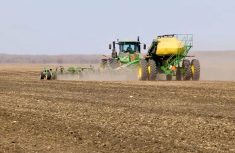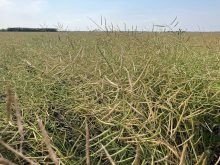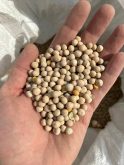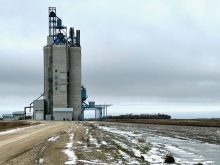Improving international trade and introducing the new food policy highlight Agriculture and Agri-Food Canada’s (AAFC) plans for the next year.
In its 2020-21 departmental plan, which sets priorities for the upcoming year, AAFC says it will “continue to assist the sector to take advantage of market opportunities and maintain or improve access to international markets, including through the negotiation and implementation of trade agreements, promoting Canadian agri-food products, and by resolving or mitigating market barriers.”
Some potential multilateral trade deals remain highlighted within the plan, which was developed before the pandemic crisis and made public in March.
Read Also

U.S. grains: Soy futures pull back as Brazil harvest advances
Chicago | Reuters – U.S. soybean futures fell on Monday on profit taking after a rally last week drove prices…
The federal government is negotiating with the Mercosur block of countries, which includes Argentina, Brazil, Paraguay and Uruguay. Exploratory talks on a trade pact were concluded, and a first round of negotiations launched, in 2018.
Another trade deal in negotiation since 2017 involves the Pacific Alliance, made up of Colombia, Chile, Mexico and Peru, each of which are already have bilateral and/or multilateral free trade pacts in effect with Canada.
The AAFC document also mentions the Association of Southeast Asian Nations (ASEAN), which includes the Philippines, Thailand, Indonesia, Laos, Cambodia, Myanmar and four Trans-Pacific Partnership countries, Vietnam, Singapore, Malaysia and Brunei. Exploratory discussions toward an ASEAN trade pact were launched in 2017 and concluded last September.
The governing Liberal party has previously committed to increase and diversify agriculture and agri-food exports in order to reach its target of $75 billion in exports for the sector by 2025.
AAFC noted “increasing protectionism in other countries” that has led to the introduction of tariffs or non-tariff trade barriers impacting producers’ economic outlooks, but said in its planning documents it will be “advocating for a predictable and stable trade environment” to help to mitigate these risks.
Changes to how AAFC consults with players across the value chain will also come within the next year.
Value chain roundtables, which AAFC now uses as a key component of consultation, will move from being commodity-specific to more thematic-based.
“The department will establish and update sector-specific and thematic tables to address issues in the sector and will formalize opportunities for engagement through a modernized model,” the plan said.
The new roundtable model will also “include opportunities for engaging women, Indigenous peoples, and youth.”
As part of that work, over the next five years, AAFC plans to develop a strategy to offer more “gender-based analysis” in order to address gender gaps across the agri-food value chain.
Gender-based analysis is a theme throughout the document, as AAFC also commits to applying it to all trade agreements and “is exploring the use of targeted calls for program applications to encourage proposals related to underrepresented groups working in the sector.”
Aimed at “creating a more co-ordinated food systems-based approach to food-related opportunities and challenges in Canada,” the Food Policy for Canada launched last summer will also be implemented over the next year, aided by $134 million in funding.
AAFC plans to move the policy forward by helping Canadian communities access healthy food, make Canadian food a top choice domestically and internationally, support food security in remote communities and reduce food waste.
AAFC will be establishing an advisory council on the food policy, with representatives from the agri-food industry, civil society and academia.
Those efforts include AAFC plans to establish the long-awaited “Buy Canadian” promotion campaign, which will include promotional products to advertise Canada’s food system at home and abroad.
A food waste reduction initiative, which will include a fund to “seek innovative solutions to reduce food loss and waste” will be implemented as well.
Other measures are included in AAFC’s 2020-21 plans, including “possible changes to the AgriStability program.”
Calls for changes to business risk management (BRM) programming have long been in the works, highlighted by an AAFC review completed in 2018.
It’s expected an announcement on changes to BRM programs will come sometime this summer, though no mention of that is made in the department’s planning documents.
AAFC is expecting to “explore experimental approaches to program delivery that could provide data and knowledge leading to the growth of domestic markets and the diversification of export markets.”
Those efforts will include a “challenge fund” for innovations in food processing, grocery retail and food service.
“Challenges offer funding and other resources to help global innovators put their ideas into action and deliver meaningful results to Canadians,” the plan said.
AAFC is planning to shift the way agri-environmental research is conducted, according to its plans, by introducing a “Living Laboratories Initiative” using $10 million to “advance agricultural discovery science and innovation.”
The Living Laboratories Initiative will fund collaborative research between farmers and scientists that develops, tests and monitors new practices in a real farm context. Two of five sites in the works have been in operation since April 2019.
A project in Manitoba focuses on climate change, soil health, water health and biodiversity while dozens of people and organizations are involved in a project on Prince Edward Island focusing on subjects such as water management and fertilizer use.
Sites in Quebec and Ontario are being set up this year, with British Columbia establishing a Living Laboratory in 2021.
“The result will be more practical technologies and sustainable farming practices that can be adopted more quickly by Canadian farmers,” AAFC said.
— D.C. Fraser reports for Glacier FarmMedia from Ottawa.
















